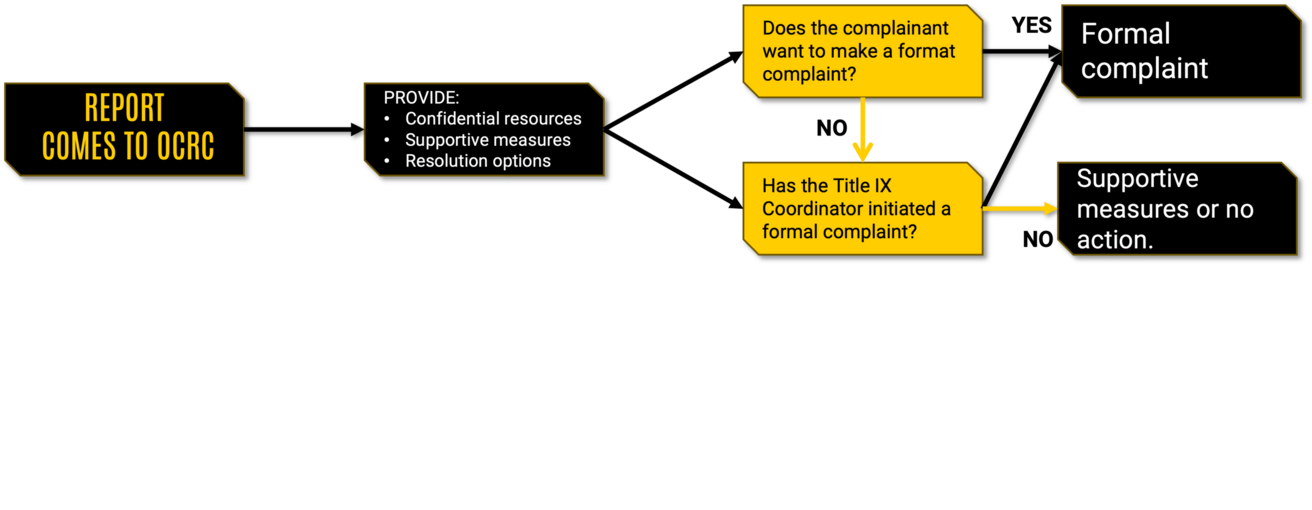Step-by-step procedures for alleged sexual misconduct violations
New Report and Initial Assessment
Process

Roles and Responsibilities
Office of Civil Rights Compliance (OCRC)
- Receives reports and meets with Complainant to explore options and provide resources
- Facilitates supportive measures
- Assesses sufficiency of formal complaints
- Determines whether the alleged misconduct falls within the scope of the Policy
- Works with the Threat Assessment Program to complete an individualized safety and risk analysis to determine if emergency removal is required
- Updates Complainant if there will be a Crime Alert or if Title IX Coordinator initiates a formal complaint
- Ensures compliance with Title IX, university policy, and other federal laws
Advisor
- Complainant and Respondent may have up to two advisors of their choosing
- Provides support and/or advice throughout a university resolution process
- May attend all meetings at which the party is entitled to be present
- Support Advisors for Complainants may be provided through a confidential certified advocacy agency (RVAP, DVIP, Monsoon, or Nisaa)
Department of Public Safety (DPS)
- Assesses whether a Crime Alert needs to be issued
Office of Civil Rights Compliance (OCRC) works with members of the university community in situations involving possible sexual harassment, sexual misconduct, dating/domestic violence, or stalking.
The Office of Civil Rights Compliance (OCRC) is not a confidential office. Information about a report may be shared as needed with others involved in the university’s response process.
Though the Title IX Coordinator may initiate a formal complaint, participation in a university resolution process is always voluntary for Complainants and Respondents.
Adaptable Resolution
Process

Roles and Responsibilities
Office of Civil Rights Compliance (OCRC)
- Provides process expertise and updates to Complainant and Respondent
- Facilitates supportive measures for both Complainant and Respondent
- Assesses suitability of the circumstances to the Adaptable Resolution
- Gauges interest of the non-requesting party to move forward with Adaptable Resolution
- Sends Notice of Formal Complaint to parties
- Ensures compliance with Title IX, university policy, and other federal laws
Advisor
- Complainant and Respondent may have up to two advisors of their choosing
- Provides support and/or advice throughout a university resolution
- May attend all meetings at which the party is entitled to be present
Adaptable Resolution Facilitator
- Works with the parties when they want to attempt to reach a resolution without a Formal Grievance Process
The Adaptable Resolution process requires a Formal Complaint and may be requested by either the Complainant or the Respondent. Such a request may be initiated at the outset of the complaint process, or at any time prior to final determination.A successful Adaptable Resolution consists of a voluntary written agreement reached by both parties.
Either party may choose to discontinue the Adaptable Resolution at any point and return to the Formal Grievance Process.
Formal Grievance Process
Process

Roles and Responsibilities
Office of Civil Rights Compliance (OCRC)
- Provides process expertise and updates to Complainant and Respondent
- Facilitates supportive measures for both Complainant and Respondent
- Determines whether Process A or Process B would apply in a Formal Grievance Process
- Sends Notice of Formal Complaint to parties
- Conducts the investigation, which includes gathering information, assessing the relevance, and synthesizing the evidence into an investigation report
- Parties will have the opportunity to inspect and review all related evidence obtained from any party as a part of the investigation.
- Makes findings and a final determination in cases not requiring a hearing
- Ensures compliance with Title IX, university policy, and other federal laws
Advisor
- Complainant and Respondent may have up to two advisors of their choosing
- Provides support and/or advice throughout a university resolution process
- May attend all meetings at which the party is entitled to be present
The Formal Grievance Process also requires a Formal Complaint. This process starts with the appointment of an investigator who gathers information, assesses relevance, synthesizes the evidence, and compiles this information into an investigation report and file of directly related evidence.
In cases where a hearing is not required (Process B), the investigator also makes findings and a final determination.
Process A - Live Hearing
Process

Roles and Responsibilities
Office of Civil Rights Compliance (OCRC)
- Provides process expertise and updates to Complainant and Respondent
- Facilitates supportive measures for both Complainant and Respondent
- Investigator presents a summary of the investigation report to the Adjudicator
- Investigator responds to questions about their report from Adjudicator and parties’ Hearing Advisors
- Issues Notice of Outcome to both Complainant and Respondent
- Ensures compliance with Title IX, university policy, and other federal laws
Hearing Advisor
- Will be provided by the university if a party does not have one
- Asks questions of parties and witnesses at the hearing
Hearing Adjudicator
- Facilitates hearing preparations and conducts the hearing
- Makes determinations on the relevancy of questions during the hearing
- Assesses credibility of the parties and witnesses
- Makes findings of fact and applies facts to the policy
- Makes final determination based on the preponderance of the evidence
- Recommends sanctions and remedies, if applicable
Sanctioning Administrator
- Receives Adjudicator’s decision, including final determination from the Office of Civil Rights Compliance (OCRC)
- When final determination indicates a policy violation, makes a sanctioning decision and writes a letter for inclusion with Notice of Outcome
Process A applies when the alleged behavior constitutes sexual harassment under Title IX or if the alleged sexual misconduct or sexual harassment, if true, would likely result in a student respondent’s suspension or expulsion. In Process A, final determination requires a live hearing with advisor-led questioning of the parties and witnesses.
A Hearing Adjudicator determines by a preponderance of the evidence whether university policy was violated and issues the final determination to the TIX Coordinator. If there is a policy violation, the Sanctioning Administrator will determine the sanction. A Notice of Outcome and sanctioning decision, if appropriate, will be issued simultaneously to the Complainant and Respondent.
Process B
Process

Roles and Responsibilities
Office of Civil Rights Compliance (OCRC)
- Provides process expertise and updates to Complainant and Respondent
- Facilitates supportive measures for both Complainant and Respondent
- Investigator makes the findings and a final determination
- Issues Notice of Outcome to both Complainant and Respondent
- Ensures compliance with Title IX, university policy, and other federal laws
Advisor
- Complainant and Respondent may have up to two advisors of their choosing
- Provides support and/or advice throughout a university resolution process
- May attend all meetings at which the party is entitled to be present
Sanctioning Administrator
- Receives final determination from the Office of Civil Rights Compliance (OCRC)
- When final determination indicates a policy violation, makes sanctioning decision and writes letter for inclusion with Notice of Outcome
Process B applies when the alleged behavior does not constitute sexual harassment under Title IX, but does constitute prohibited conduct within the Interim Policy on Sexual Harassment and Sexual Misconduct and, if true, would not result in a student respondent’s suspension or expulsion.
The investigator(s) will issue an investigation report including findings and a final determination based on a preponderance of the evidence.
Appeal
Process

Roles and Responsibilities
Office of Civil Rights Compliance (OCRC)
- Provides process expertise and updates to Complainant and Respondent
- Facilitates supportive measures for both Complainant and Respondent
- Reviews Request for Appeal to confirm that it is timely and based on at least one of the grounds for appeal
- Sends Notice of Appeal and appeal responses to parties
- Sends Request for Appeal, any responses to appeal, and case file to the Appeal Officer
- Sends Notice of Appeal Outcome to the parties
- Ensures compliance with Title IX, university policy, and other federal laws
Advisor
- Complainant and Respondent may have up to two advisors of their choosing
- Provides support and/or advice throughout a university resolution process
- May attend all meetings at which the party is entitled to be present
Appeal Officer
- Reviews appeal documents, including the Request for Appeal, case file, and any responses submitted by the parties
- Renders a finding and rationale on each ground for appeal
- Sends appeal outcome to the Office of Civil Rights Compliance (OCRC) for distribution to the parties
- See the Procedure for Alleged Violations of the Policy on Sexual Harassment and Sexual Misconduct, Section aj.(1) Appeal Officers for information about who reviews appeals
Any party may submit a written Request for Appeal within 5 days of issuance of the Notice of Outcome based on at least one of the following grounds:
- The procedural irregularity that affected the outcome of the matter;
- New evidence that was not reasonably available at the time the determination regarding responsibility or dismissal was made, that could affect the outcome of the matter;
- The Title IX Coordinator, Investigator(s), or Adjudicator(s) had a conflict of interest or bias for or against Complainants or Respondents generally or the specific Complainant or Respondent that affected the outcome of the matter; and/or
- The decision, whether regarding responsibility and/or sanction, was not supported by substantial evidence when viewed as a whole.
Contact Our Team
455 Van Allen Hall, Iowa City, IA 52242
319.335.0705
Email: ocrc-titleIX@uiowa.edu
Office Hours: Mon. - Fri., 8 a.m. - 5 p.m.
Sexual Misconduct and Title IX Staff

Tiffini Stevenson Earl, JD

Monique DiCarlo

Bianca Esquivel

Krista Kronstein

